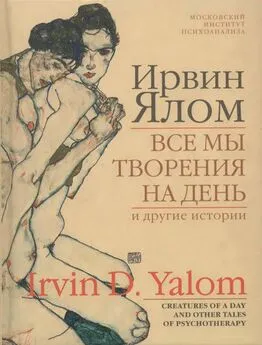Ирвин Ялом - The Schopenhauer Cure
- Название:The Schopenhauer Cure
- Автор:
- Жанр:
- Издательство:неизвестно
- Год:неизвестен
- ISBN:нет данных
- Рейтинг:
- Избранное:Добавить в избранное
-
Отзывы:
-
Ваша оценка:
Ирвин Ялом - The Schopenhauer Cure краткое содержание
The Schopenhauer Cure - читать онлайн бесплатно полную версию (весь текст целиком)
Интервал:
Закладка:
patients report such a thing. But it didn`t turn out that way for him. Maybe I was being
masochistic—wanted to rub my nose in it. Maybe I chose my biggest failure in order to
give myself a second chance. I admit it—I frankly don`t know my motives. And then
during the course of our discussion Philip told me of his career change and asked if I
would be willing to be his supervisor. Philip,” Julius turned to face Philip, «I assume you
filled the group in on this?»
«I provided the necessary details.»
«Can you be a little more cryptic?»
Philip looked away, the rest of the group looked uncomfortable, and after a long
silence Julius said, «I apologize for the sarcasm, Philip, but can you see where your
answer left me?»
«As I said, I provided the necessary details to the others,” Philip said.
Bonnie turned to face Julius: «I`ll be upfront. This feels unpleasant, and I`m
rescuing you. I don`t think you need to be hassled today—I think you need to be taken
care of. Please, what can we do for you, today?»
«Thanks, Bonnie, you`re right, I am shaky today—your question`s a lovely one,
but I`m not sure I can answer it. I`ll tell you all a big secret: there have been times I`ve
entered this room feeling bad because of some personal issues and left feeling better just
as a result of being a part of this terrific group. So maybe that`s the answer to your
question. The best thing for me is simply for all of you to use the group and not let my
situation bring us to a total stop.»
After a short silence Tony said, «Tough assignment with what`s gone down today.»
«Right,” said Gill. «It`ll feel awkward to talk about anything else.»
«These are the times I miss Pam,” said Bonnie. «She was the one who always knew
what to do—no matter how awkward the situation.»
«Funny, I was thinking about her earlier too,” said Julius.
«It must be telepathy,” said Rebecca. «Just a minute ago Pam went through my
mind also. It was when Julius talked about successes and failures.» She turned to Julius:
«I know she was your favorite child in our family here—and that`s not a question—it`s so
obvious. What I`m wondering is whether you feel like you failed with her—you know,
her taking a couple of months off to seek another kind of therapy because we couldn`t
help her. That can`t be great for your self–esteem.»
Julius gestured toward Philip. «Maybe you should fill him in.»
«Pam`s a real force here,” Rebecca said to Philip, who did not meet her eyes. «Both
her marriage and a relationship with a lover fell apart. She decided to leave her marriage
but then the lover opted not to leave his wife. She got upset with both men and obsessed
about them day and night. Try as we could, we never found a way to help her. In
desperation she took off for India to seek help from a famous guru at a Buddhist
meditation retreat.»
Philip made no response.
Rebecca turned back to face Julius. «So how did you feel about her taking off?»
«You know, up to about fifteen years ago I would have been very uptight—more
than that, I might even have taken a strong stand against it and insisted that her search for
another form of enlightenment was just resistance to change. I`ve changed. Now I feel I
need all the help I can get. And I`ve found that participation in some other mode of
growth, even flaky stuff, can often open up new areas for our therapeutic work. And I
sure hope that will be true for Pam.»
«It may have been not a flaky but an excellent choice for her,” said Philip.
«Schopenhauer felt positive about Eastern meditative practice and its emphasis on mind
clearing, on seeing through illusion, and its approach to relieving suffering by teaching
the art of letting go of attachments. In fact, he was the first to introduce Eastern thought
into Western philosophy.»
Philip`s comment was made to no one in particular, and no one responded. Julius
felt irritated about hearing Schopenhauer`s name so often but kept it to himself as he
noted several members nodding in appreciation of Philip`s remarks.
After a brief silence Stuart commented, «Shouldn`t we go back to where we were a
few minutes ago when Julius said that what would be best for him would be for us to get
to work in the group?»
«I agree,” said Bonnie, «but where to start? How about a follow–up on you and
your wife, Stuart? Last we heard she e–mailed you that she was thinking of leaving the
marriage.»
«It`s settled down and we`re back to status quo. She`s keeping her distance, but at
least things are no worse. Let`s see what else is pending in the group.» Stuart looked
around the room. «I can think of two items. Gill, how about you and Rose—what`s been
happening there? And, Bonnie, you said earlier today you had something to work on, but
it felt too trivial.»
«I want to pass today,” said Gill, looking downward. «I took too much time last
week. But the bottom line is defeat and capitulation. I`m ashamed to be back home in the
same situation. All that good advice from Philip, from all of you, was wasted on me. How
about you, Bonnie?»
«My stuff feels like small potatoes today.»
«Remember my version of Boyle`s law,” said Julius. «A small amount of anxiety
will expand to fill our whole anxiety cavity. Your anxiety feels just as awful as anxiety in
others that comes from more obviously calamitous sources.» He looked at his watch.
«We`re just about out of time, but do you want to open it up? Get it on the agenda?»
«To stop me from chickening out next week, you mean?» asked Bonnie. «Well,
that`s not a bad idea. What I was going to bring up has to do with my being homely and
fat and clumsy and Rebecca—and also Pam—being beautiful and...and stylish. But,
Rebecca, you, especially, open up a lot of painful old feelings for me—feelings I`ve
always had about being klutzy, homely, unchosen.» Bonnie stopped and looked at Julius.
«There, it`s out.»
«And on the agenda for next week,” said Julius, rising to signal the end of the
meeting.
14
1807—How
Arthur
Schopenhauer
Almost Became
a Merchant
_________________________
Aperson of high, rare mental
gifts who is forced into a job
which is merely useful is like
a valuable vase decorated with
the most beautiful painting
and then used as a kitchen
pot.
_________________________
The Schopenhauer family`s grand tour ended in 1804, and the sixteen–year–old Arthur,
with a heavy heart, honored his pledge to his father by commencing his seven–year
apprenticeship with Senator Jenisch, an eminent Hamburg merchant. Slipping into a
double life, Arthur fulfilled all the quotidian tasks of his apprenticeship but
surreptitiously spent every spare moment studying the great ideas of intellectual history.
He had so internalized his father, however, that these stolen moments filled him with
remorse.
Then, nine months later came the staggering event that marked Arthur`s life
forever. Though Heinrich Schopenhauer was only sixty–five, his health had rapidly
deteriorated: he appeared jaundiced, fatigued, depressed, and confused, often not
recognizing old acquaintances. On the twentieth of April, 1805, he managed, despite his
infirmity, to travel to his Hamburg warehouse, slowly climb to the upper loft of the
granary, and hurl himself out of the window into the Hamburg Canal. A few hours later
his body was found floating in the icy water.
Every suicide leaves a wake of shock, guilt, and anger in the survivors, and Arthur
experienced all these sentiments. Imagine the complexity of feelings Arthur must have
experienced. His love for his father resulted in intense grief and loss. His resentment of
his father—later he often spoke of his suffering from his father`s excessive hardness—
evoked remorse. And the wonderful possibility of liberation must have evoked much
guilt: Arthur realized that his father would have forever blocked the path to his becoming
a philosopher. In this regard one thinks of two other great free–thinking moral
philosophers, Nietzsche and Sartre, who lost their fathers early in life. Could Nietzsche
have become the Antichrist if his father, a Lutheran minister, had not died when
Nietzsche was a child? And in his autobiography Sartre expresses his relief that he was
not burdened with the search for his father`s approbation. Others, Kierkegaard and Kafka,
for example, were not so fortunate: all their lives they were oppressed by the weight of
their fathers` judgment.
Though Arthur Schopenhauer`s work contains an enormous range of ideas, topics,
historical and scientific curiosities, notions, and sentiments, there are to be found only a
couple of personal tender passages, and each pertains to Heinrich Schopenhauer. In one
passage Arthur expresses pride in his father`s honest admission that he was in business to
make money and compares his father`s forth–rightness to the duplicity of many of his
fellow philosophers (particularly Hegel and Fichte), who grasp for wealth, power, and
fame all the while pretending they are working for humanity.
At the age of sixty he planned to dedicate his complete works to the memory of his
father. He worked and reworked the wording of his dedication, which ultimately was
never published. One version began: «Noble, excellent spirit to whom I owe everything
that I am and that I achieve...any one finding in my work any kind of joy, consolation,
instruction, let him hear your name and know that, if Heinrich Schopenhauer had not
been the man he was, Arthur Schopenhauer would have perished a hundred times.»
The strength of Arthur`s filial devotion remains puzzling, given Heinrich`s lack of
any overt affection toward his son. His letters to Arthur are laced with criticism. For
example: «Dancing and riding do not make for a livelihood for a merchant whose letters
have to be read and must therefore be well written. Now and then I find that the capital
letters in your hand are still veritable monstrosities.» Or: «Do not acquire a round back,
which looks ghastly.... if in the dining room one catches sight of someone stooping, one
takes him for a disguised tailor or cobbler.» In his very last letter Heinrich instructed his
son: «With reference to walking and sitting upright, I advise you request everyone you
are with to give you a blow whenever you are caught oblivious of this great matter. This
is what children of Princes have done, not minding the pain for a short time, rather than
appear as oafs all their lives.»
Arthur was his father`s son, resembling him not only physically but
temperamentally. When he was seventeen, his mother wrote him: «I know too well how
little you had of a happy sense of youth, how large the disposition for melancholic
brooding you received as a sad share of your inheritance from your father.»
Arthur also inherited his father`s deep sense of integrity, which played a decisive
role in the dilemma that confronted him following his father`s death: should he stay in the
apprenticeship even though he hated the world of commerce? Eventually, he decided to
Читать дальшеИнтервал:
Закладка:









